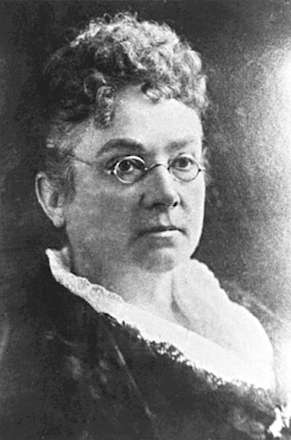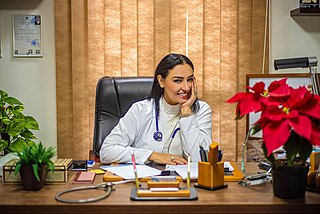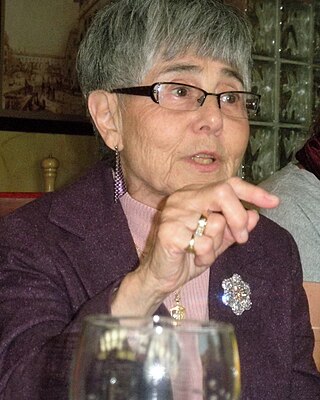Related Research Articles

Emily Howard Stowe was a Canadian physician who was the first female physician to practise in Canada, the second licensed female physician in Canada and an activist for women's rights and suffrage. Stowe helped found the women's suffrage movement in Canada and campaigned for the country's first medical college for women.
Sylvia Ostry was a Canadian economist and public servant.
Ricky Kanee Schachter, FRCP(C), CM was a dermatologist who practiced in the Toronto area, and was invested as a Member of the Order of Canada in 1998, as "a researcher, teacher, administrator and healer, whose work in the areas of skin cancer and psoriasis has improved the lives of her patients, and inspired fellow researchers across Canada."

Emma Constance Stone was the first woman to practice medicine in Australia. She played an important role in founding both the Queen Victoria Hospital, and the Victorian Medical Women's Society in Melbourne.

The presence of women in medicine, particularly in the practicing fields of surgery and as physicians, has been traced to the earliest of history. Women have historically had lower participation levels in medical fields compared to men with occupancy rates varying by race, socioeconomic status, and geography.
Veronica Jane Strong-Boag is a Canadian historian specializing in the history of women and children in Canada. She is a Professor Emerita at the University of British Columbia, where she was Professor of Women's History and the founding Director of the Centre for Women’s and Gender Studies.
Susan Jane Bradley is a Canadian psychiatrist. She has written many journal articles and books, including Gender Identity Disorder and Psychosexual Problems in Children and Adolescents and Affect Regulation and the Development of Psychopathology. Bradley was chair of the DSM-IV Subcommittee on Gender Disorders.

Wendy Diane Savage is a British gynaecologist, and advocate and campaigner of women's rights in childbirth and fertility.
Jerusha Jacob Jhirad FRCOG, MBE was an Indian physician.
The History of women in Canada is the study of the historical experiences of women living in Canada and the laws and legislation affecting Canadian women. In colonial period of Canadian history, Indigenous women's roles were often challenged by Christian missionaries, and their marriages to European fur traders often brought their communities into greater contact with the outside world. Throughout the colonial period, European women were encouraged to immigrate to Canadian colonies and expand the white population. After Confederation in 1867, women's experiences were shaped by federal laws and by legislation passed in Canada's provincial legislatures.

Annmarie Adams is an architectural historian and university professor. She is the former Chair of the Department of Social Studies of Medicine and is the former Director of the School of Architecture at McGill University. Adams specializes in healthcare architecture and gendered space. At McGill she teaches courses in architectural history and research methods. She is the inaugural holder of the Stevenson Chair in the History and Philosophy of Science, including Medicine. She is a board member of the Society of Architectural Historians and former board member of the Vernacular Architecture Forum.
Mitchinson may refer to:

Florence Pat Haseltine is a U.S. physician, biophysicist, reproductive endocrinologist, journal editor, novelist, inventor, and advocate for women's health. She has been diagnosed with dyslexia. She built a diverse career in medicine. An associate professor at Yale University, her work specializes in obstetrics and gynecology as well as women's rights and gender bias in medicine. While at Yale, Haseltine established the embryology laboratory, which was one of the early labs to have a successful IVF baby. The Microscope used in the laboratory is now in Historical Collections of the National Museum of Health and Medicine.
Lorraine Dennerstein M.B.B.S., Ph.D., D.P.M., M.R.A.N.Z.C.P., F.R.A.N.Z.C.P., HonDMedSc is a leading Australian researcher and practicing psychiatrist specialising in women's mental and sexual health.

Catharine Macfarlane (1877–1969) was an American obstetrician and gynecologist who founded one of the first screening centers for uterine cancer in the United States. She was the first woman fellow of the College of Physicians of Philadelphia, and the first woman president of the Obstetrical Society of Philadelphia.

May Cohen, OC is a Canadian physician and educator. She is best known for initiating the creation of a women's health curriculum in Ontario medical schools and for her work as a women's health advocate.
Jennifer Gunter is a Canadian-American gynecologist, a New York Times columnist covering women's health, an author, and a specialist in chronic pain medicine and vulvovaginal disorders.
Marion G. Powell was a Canadian physician and medical missionary. Throughout her life, she earned the title of the "mother of birth control in Canada", because of her work in advocating for sex education and birth control. One of her most notable accomplishments is her contribution to helping open one of the first "municipally funded" clinics for birth control in Ontario in 1966. She is also celebrated for her work at the Women's College Hospital (WCH) Bay Centre for Birth Control where she was the Director from 1981 to 1990.
Rowena Grace Douglas Hume was a Canadian obstetrician and one of the founders of Toronto's Women's College Hospital. She was also the first Chief of Obstetrics at the hospital from 1911 to 1926.
Joyce Zemans is a Canadian art historian, curator, cultural policy specialist and academic. She is known as the first woman to serve as York University`s Dean of Fine Arts and as director of the Canada Council for the Arts (1988-1992).